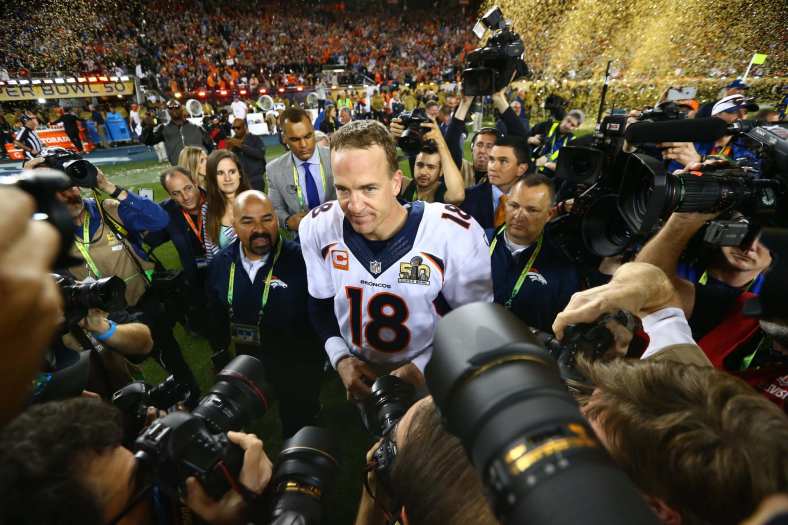
Peyton Manning may have just played his last meaningful NFL game. He and the Denver Broncos defeated the Carolina Panthers in Super Bowl 50 by the score of 24-10. It was his second NFL championship, having won with the Indianapolis Colts in Super Bowl XLI.
Now that that’s out of the way, where does Manning rank with the best quarterbacks of the Super Bowl era, which now spans 50 years?
One note before we get going: We’re only listing 15 quarterbacks here, meaning there will be some fine omissions.
Certainly, if you feel anyone was unfairly snubbed, feel free to comment, but we should take a second to go over two names you won’t see: Johnny Unitas and Bart Starr. Both men won Super Bowls but spent the majority of their careers (and certainly primes) before the Super Bowl era. Here, we’re looking at guys who spent most, or all of their careers in the Super Bowl era.
With that out of the way, where does Peyton Manning rank with the greatest quarterbacks of the last 50 years?
15. Dan Fouts
We’ll address the negative elephant in the room first. With Dan Fouts under center, the San Diego Chargers never won or even made a Super Bowl. Fortunately for Fouts, the positives are staggering.
Fouts starred as the quarterback in coach Don Coryell’s “Air Coryell” attack, which was an evolutionary passing offense. In many ways, it laid the groundwork for the prolific offenses that quarterbacks like Kurt Warner, Peyton Manning, and Drew Brees would later use to win Super Bowls.
Beginning in 1979, Fouts broke the single-season passing record in three consecutive years, throwing for 4,082 yards in 1979, 4,715 in 1980, and 4,802 in 1981. When he retired in 1987, Fouts was second on the career passing yards list and fourth in career touchdowns.
His lack of postseason success keeps Fouts from being any higher. But the fact that he was statistically brilliant and a trendsetter gives him a deserving spot on the list.
14. Kurt Warner
Kurt Warner wasn’t great for many years, but he was a dominant quarterback during his peak years. Warner won two MVP awards in three seasons, took the Rams to two Super Bowls in that time, winning one of them.
It seemed as though that would be it for Warner, as he fell into relative obscurity for about five seasons afterwards before earning the starting position for the Arizona Cardinals. With Warner under center, the Cardinals won the NFC West Championship in 2008 and 2009. In 2008, the quarterback threw for 4,583 yards, 30 touchdowns, and 14 interceptions, reaching the first Super Bowl in franchise history.
Lastly, while a 1-2 record wouldn’t point to a great to Warner being a great big game quarterback, the numbers do. His three games are the three highest single-game yardage totals in Super Bowl history. All of those games came down to the wire, too, so there was no garbage time.
13. Troy Aikman
In many ways, Troy Aikman was the anti-Dan Fouts. His numbers were not particularly special, as the Dallas Cowboys tended to rely heavily on Emmitt Smith running behind the the Great Wall of Dallas. But unlike Fouts, Aikman enjoyed playoff success, and a lot of it, winning three Super Bowls in four years from 1992-1995.
The NFC was stacked in the early to mid 1990’s. The Steve Young-led San Francisco 49ers had most of the 1980’s core in tact, while Brett Favre and the Green Bay Packers were an emerging power. Additionally, the New York Giants and Washington Redskins still had much of their core in tact from their late 80’s-early 90’s championship teams. Still, Aikman’s Cowboys were by far the best.
Aikman dominated the 1992 playoffs, throwing for 795 yards, eight touchdowns, and zero interceptions in three games, culminating in a nearly flawless Super Bowl XXVII performance that earned him the game’s MVP.
12. Ben Roethlisberger
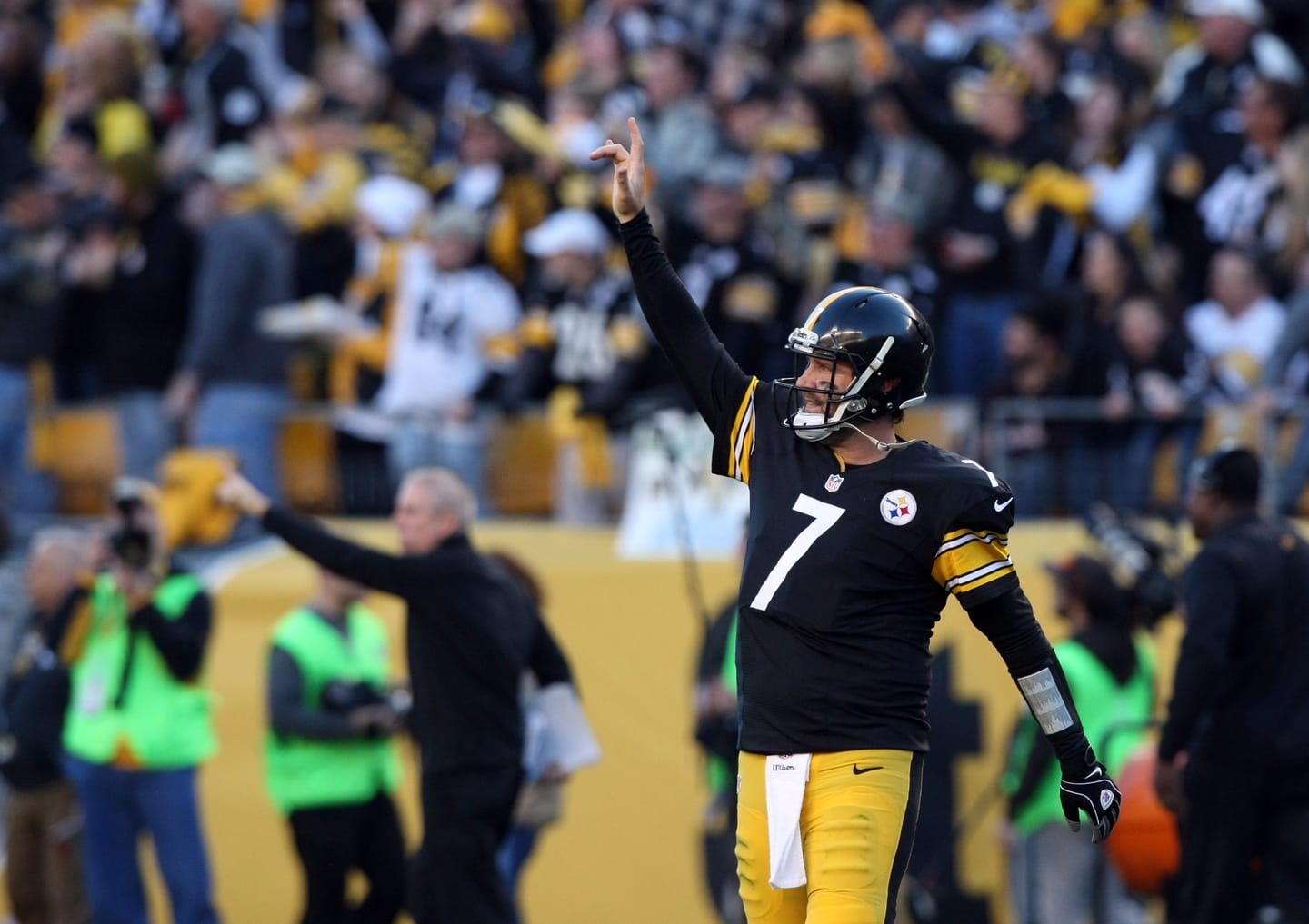
Despite competing with some strong Baltimore Ravens and Cincinnati Bengals teams in the AFC North, and some fantastic Tom Brady-led New England Patriots and Peyton Manning-led Indianapolis Colts/Denver Broncos squads, Ben Roethlisberger and the Pittsburgh Steelers have carved out quite a niche for themselves.
Individually, Roethlisberger has topped 4,000 yards on four separate occasions and just missed in an injury plagued 2015. His 4,952 yards led the NFL in 2014.
Roethlisberger’s performance in Super Bowl XLIII was tremendous. The Steelers drove 78 yards (88 after a penalty) for the winning touchdown in a nearly flawless two-minute drill. Roethliseberger’s arm and legs accounted for every yard.
The Steelers were a consistent contender through the 1990’s and early 2000’s, but only lost one Super Bowl in that time. Since he took over, they’ve made the playoffs eight times in Roethlisberger’s 12 years as a starter, winning five division titles, three AFC Championships and two Super Bowls.
11. Steve Young
While Steve Young’s San Francisco 49ers consistently struggled against Aikman’s Cowboys and Favre’s Packers, Young was the most prolific quarterback of the 1990’s. He won two MVP’s (1992, 1994), led the league in passer rating six times, completion percentage five times, and touchdown passes four times. Young was also a fantastic runner. His 49 career rushing touchdowns are currently tied with Cam Newton for the most ever by a quarterback.
Young’s shining moment came in 1994. He was finally able to beat Aikman and the Cowboys in the NFC Championship Game and two weeks later, the 49ers defeated the Chargers 49-26 in Super Bowl XXIX. Young threw for six touchdowns in that game, breaking Joe Montana’s record.
While Young only won a single Super Bowl as a starter, his contributions to San Francisco’s Super Bowl seasons of 1988 and 1989 were also significant. He started six games (three in each season), going 5-1. That helped keep Montana fresh for those postseasons, but more on those later.
10. Brett Favre
No player, quarterback or otherwise, has started more games and consecutive games than Brett Favre. No quarterback has won more games, attempted or completed more passes, and only Peyton Manning has more yards and touchdown passes.
Unfortunately, there are some drawbacks. Nobody has thrown more interceptions, and it’s not terribly close. Six times, Favre threw 20 or more interceptions in a season, leading the NFL three times. He also had a tendency to throw picks at the worst possible moments of big games, which keeps Favre from being any higher.
On the positive end, he won three straight league MVP awards, reached two Super Bowls and winning one. Favre finished the 1996-97 postseason with five touchdowns, only one interception and a 107.5 passer rating.
Still, his shining moment came in December of 2003 when, less than 24 hours after the sudden death of his father, Favre started on Monday Night Football against the Oakland Raiders. Favre not only maintained his consecutive starts streak, but completed 22 of 30 passes for 399 yards, four touchdowns, and no picks.
The gunslinger wasn’t perfect, but he was memorable.
9. Terry Bradshaw
It’s incredibly hard to rank quarterbacks from Terry Bradshaw’s era with the more modern ones. They played most of their seasons with a 14-game schedule and even if we extrapolate the numbers, they’re still nowhere close to the guys from the 1980’s on.
Defenders were able to get away with a lot more in the 1970’s and before, and until the Air Coryell Chargers and West Coast Offense 49ers of the early 1980’s, nearly all of the best NFL teams were run heavy offenses.
Still, Terry Bradshaw’s career accolades are immense. He won the NFL’s MVP Award in 1978 and earned two Super Bowl MVP Awards (XIII, XIV).
Bradshaw’s Steelers were the Team of the 70’s, making four trips to the Super Bowl and winning them all. In those games, Bradshaw threw nine touchdowns against only four interceptions. To date, Bradshaw’s Steelers are the only team to repeat as Super Bowl champs twice.
8. Dan Marino
While he never led the Miami Dolphins to a Super Bowl win, Dan Marino was a statistical giant. He threw for 4,000 or more yards six times, led the NFL in passing yards five times and touchdown passes three times.
The Dolphins reached one Super Bowl in Marino’s career — a 38-16 loss to the 49ers in Super Bowl XIX. While the 1984 season ended in disappointment, it was Marino’s peak year. His 48 touchdowns obliterated the previous record of 36, shared record of George Blanda (1961) and Y.A. Tittle (1963). That mark stood until 2004.
He also became the first man to top 5,000 yards in a season chucking the ball for 5,084 yards, setting a record that stood until 2011.
Unfortunately, Marino and the Dolphins wouldn’t enjoy much more postseason success. Miami made two more AFC Championship Games under Marino, losing both. That’s definitely a notch against Marino, but his statistical dominance was overwhelming and his records stood for so long that Marino’s easily a top-10 quarterback of the Super Bowl era.
7. Drew Brees
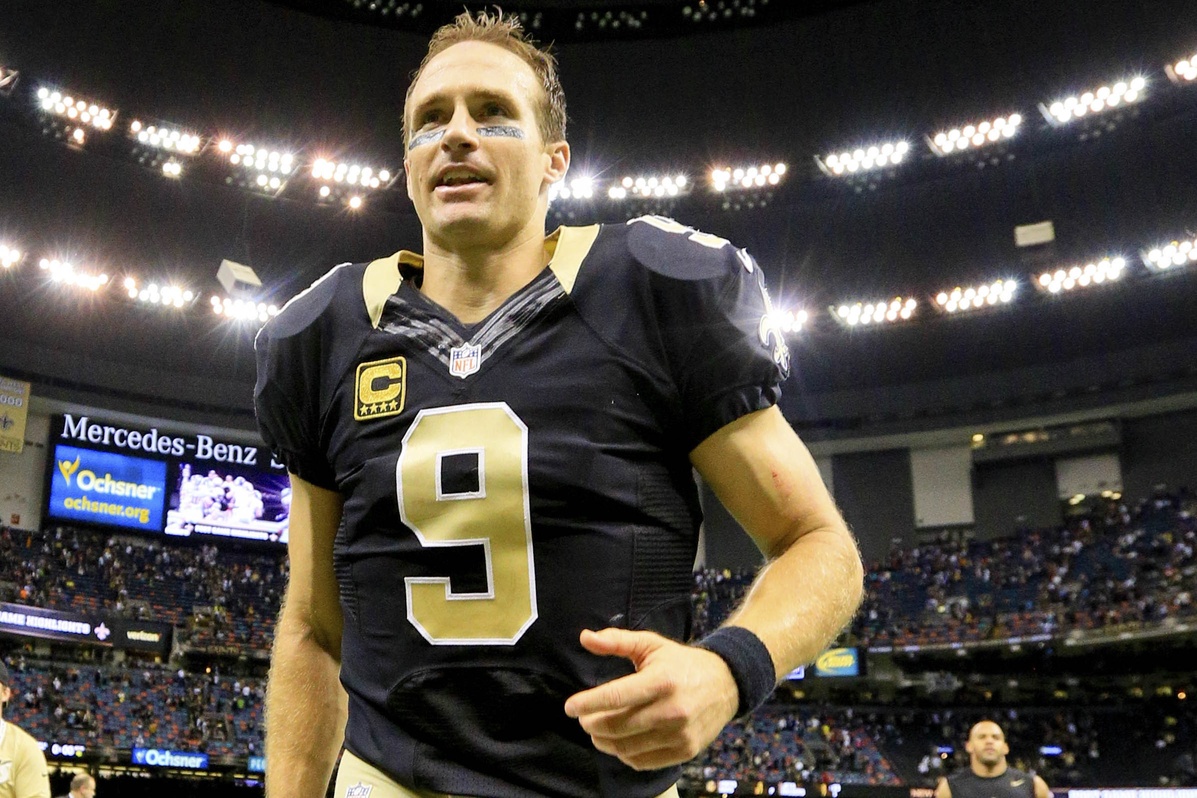
Statistically, Drew Brees is the 2000’s equivalent of Dan Fouts and Dan Marino. The NFL has become more pass-happy over the years, so passing yardage records are always going to skew to the more recent.
Marino threw for 5,084 yards in 1984, becoming the first member of the 5,000 yard club. That mark has been hit seven times since 2008. Still, Brees is the only man to top 5,000 yards more than once, and he’s done it four times (2008, 2011-2013).
It’s what happened between those 5,000 yard seasons that separates Brees from Fouts. The New Orleans Saints won Super Bowl XLIV in February of 2010. During that playoff run, Brees outperformed Kurt Warner, Brett Favre, and Peyton Manning. Not a bad run.
Additionally, Brees is probably more responsible for any one man than revitalizing a moribund New Orleans Saints franchise. He signed with the Saints following a 3-13 2005 season, where they essentially had no home. In 2006, they were in the NFC Championship Game and in 2009, they won the Super Bowl.
Pretty significant.
6. Aaron Rodgers
In 2008, the Packers made a controversial decision to move on from Brett Favre and go with Aaron Rodgers as the starter. Now, the move doesn’t seem so controversial.
Rodgers has topped 4,000 yards five different times, 30 touchdowns on five other occasions and has never thrown more than 13 interceptions in a single season. He’s also currently the highest-rated passer in NFL history and has won two MVP awards (2011, 2014). He’s led the team to a playoff appearance in every season since 2009, winning an NFC North title every year from 2011-2014.
Rodgers and the Packers won a Super Bowl in 2010. In that postseason, he threw nine touchdowns and only two picks. Overall, the Packers have generally not surrounded Rodgers with a championship caliber team and if we’re being really nice, Mike McCarthy’s big game coaching has been questionable.
If we’re revisiting this list in a few years, it’s very possible Rodgers will be even higher. For now, No. 6 is not bad for a guy who just turned 32.
5. Roger Staubach
Much like Terry Bradshaw, figuring out how to rank Roger Staubach with more contemporary passers is tricky. His closest comparison listed here would probably be Steve Young, in that he led the league in passer rating four times, was a threat with his legs and arm, but his era probably kept him from more playoff success.
Staubach’s Cowboys did earn five trips to the Super Bowl, although one came when he was backing up Craig Morton. Dallas won two Super Bowls with Staubach under center and lost two four-point games to Terry Bradshaw and the Steelers.
The Cowboys were never out of a game with Staubach, as he led them to 15 comeback victories. One of those comebacks was completed with a 50-yard touchdown pass to Drew Pearson in the final seconds of a Divisional Playoff victory over the Minnesota Vikings also brought the term “Hail Mary” to fame.
While Bradshaw’s Steelers were 2-0 against Staubach’s Cowboys in Super Bowls, Roger the Dodger can take some solace in coming in higher on this list.
4. Peyton Manning
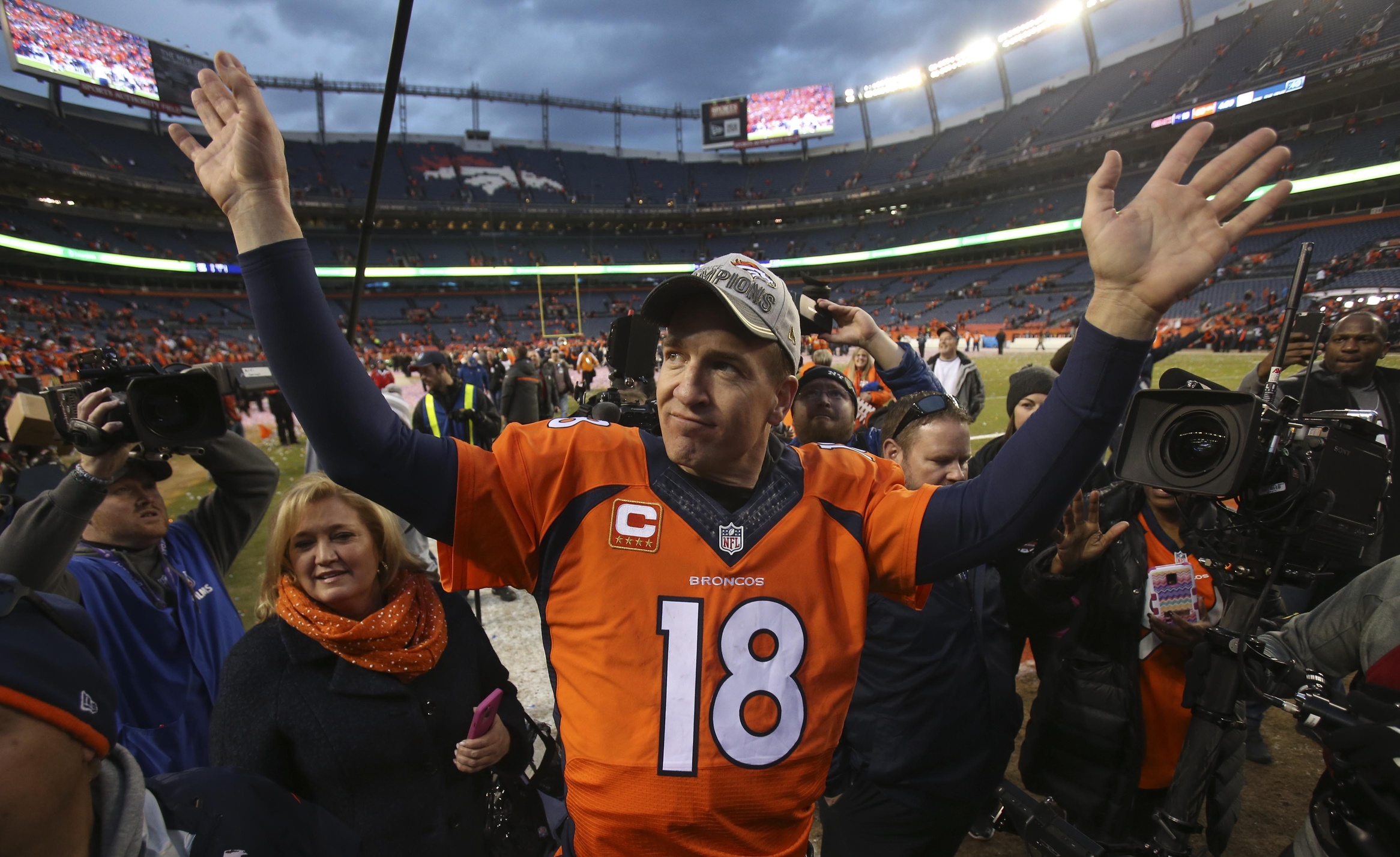
Peyton Manning has broken new statistical ground in his career in a big way. He’s only failed to throw for 4,000 yards three times (four if we count a lost 2011 season), holds the single season and career marks for touchdowns and passing yards, and has claimed a record five MVP awards.
As a matter of fact, let’s go out on a limb with a controversial statement: The Colts made the right choice when they took Manning over Ryan Leaf in 1998.
Even with the second playoff win, Manning’s playoff record holds him back a bit. His Colts and Broncos teams suffered nine postseason one-and-done’s. Six of those losses came at home. Also, while his interception totals aren’t as prolific as Favre’s, Manning has had a tendency to throw interceptions at the absolute wrong part of big games.
Still, Manning’s statistical dominance and longevity is overwhelming. His first 4,000-yard season came in 1999, his most recent came in 2014, and he did it 12 times in between.
On top of all of that, while Manning was not the first quarterback to run a no-huddle offense, his perfection of it changed the way that many teams and quarterbacks play.
If we just saw the last game in the career of Peyton Manning, we just saw the last game of one of the greatest quarterbacks and players in NFL history. Also, what a way to go out.
3. John Elway
The only quarterback to have an exit on par with Manning’s, John Elway actually one-upped it, winning two Super Bowls in a row before retiring. Elway was an amazing physical talent that wasn’t always given great help from his front office or head coaches. If that doesn’t sound like Aaron Rodgers, I don’t know what does.
Elway’s peak years were in an especially weak era of AFC football, so he did make three Super Bowls in his prime. Still, his Broncos lost by 19 in the first big game with Elway under center, and that ended up being by far the best of the three.
As Elway’s career was winding down, the Broncos finally put a championship caliber roster around him and gave him an adequate coach in Mike Shanahan. There, he finally got his crowning achievement, winning Super Bowls XXXII and XXXIII and riding off into the sunset.
Even being on the wrong end of three Super Bowl blowouts, Elway’s overall track record an otherworldly talent makes him one of the best three quarterbacks of the Super Bowl era.
2. Tom Brady
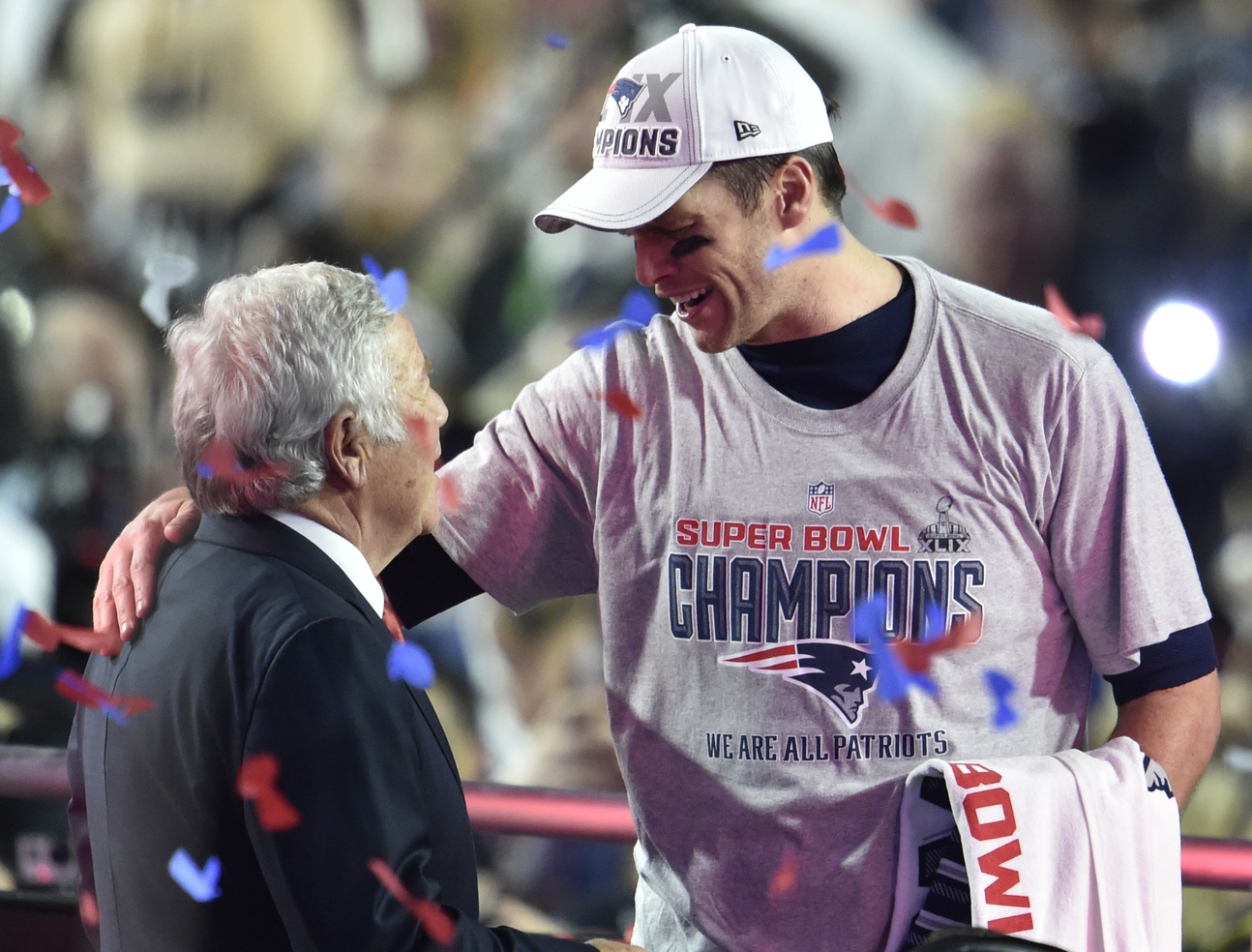
Could Tom Brady have put up numbers comparable to Peyton Manning if he went to the Colts? Could Peyton Manning have excelled under a coach like Bill Belichick in New England? We’ll never know. The two are easily Hall of Fame quarterbacks. Why is Brady ranked higher?
Ultimately, it’s too hard to ignore the fact that Brady has generally done better against similar competition.
The most notable occurrence of this came in Super Bowl XLIX against the Seattle Seahawks. Seattle overwhelmed Manning and the Broncos, but Brady picked them apart in a fourth quarter comeback the next year. Even if the Seahawks had scored on their final drive and won, Brady would have been far better than Manning against the same defense only one year later.
Brady’s track record of success is amazing. Only Manning has had more 4,000 passing yard seasons. No quarterback has started in more Super Bowls or conference championship games.
Brady’s achievements are almost good enough to make him the best quarterback of the Super Bowl era.
1. Joe Montana
There’s so much to say about Joe Montana.
He won one Super Bowl prior to Roger Craig’s arrival and two prior to Jerry Rice.
His last minute drives produced not one, but two of the league’s most iconic postseason moments.
No quarterback was ever better than Montana during his 1988-89 and 1989-90 postseasons. Over those six games, Montana threw for 1,623 yards 19 touchdowns, and only one interception.
Only Terry Bradshaw (4-0) and Tom Brady (4-2) have as many Super Bowl wins as Montana (4-0). Montana’s three Super Bowl MVP’s in four games are tied only with Brady, who’s won three in six.
Every quarterback Montana beat in a Super Bowl is in the Hall of Fame (John Elway), won the NFL MVP that season (Ken Anderson, Boomer Esiason), or both (Dan Marino).
In his four Super Bowls, Montana had a passer rating of 127.9, threw for 1,142 yards, ran for 105 yards and two touchdowns, and threw 11 touchdowns with zero interceptions.
If you had one game to win with your life on the line, Montana would be the best quarterback to take. That makes him the greatest of all time.